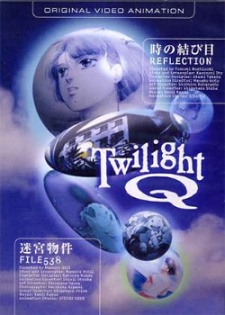
Reflection
I feel like when Mochizuki Tomomi decided to direct Reflection for his entry in Twilight Q, he just saw a camera lying around his house and decided to riff from there. A girl named Mayumi finds a camera in the ocean and decides to get the photos printed for fun, only to find one of herself locking arms with a man she's never met before. The investigation gets paranormal, and from there the two basic strategies the story could take would be a haunted camera or a photo from the future. Reflection turns out to be the latter, and so Mochizuki is tasked with providing an entertaining time travel story that eventually closes the loop. In terms of wrapping up the time loop he is successful, but I would say the story is too bogged down in odd details to fully be called an enjoyable ride.
After some discussion with the company that made the camera—or in this case hadn't yet made it—the camera evaporates on the table. Soon afterwards Mayumi ends up on a voyage back to the island to solve the mystery, which coincides with a poisonous red tide that her best friend Kiwako's brother goes out to investigate. Their joint investigation seems to be leading to some higher truth in this mystery, but suddenly Mayumi is whisked away to the future, and then the past, before arriving back before the investigation ever happened, with no real explanations for anything in between. Some cute messages are mixed in, with a romance between Mayumi and the boy in the photograph that seems to give rise to itself retroactively vis-a-vis the photo, and a short segment on whether or not history books tell the truth, a controversy that ironically enough would reappear on the Japanese stage within a decade. In the end though, Reflection seems to be shooting wildly, without a clear goal or focus, and so even as everything is tied up in a neat little package by the end I left with far more questions than answers.
File 538
Oshii Mamoru's File 538 walks the line between a supernatural mystery story and film noir, an inventive tale of a private eye discovering the horrifying truth behind his latest case written on a typewriter by his target, a man living with his daughter in an abandoned apartment complex on the outskirts of a dreary city. At the outset, a commercial plane is transformed into a giant koi fish before our very eyes, perhaps a match for the koi in the fish tank in their apartment visible in the next shot, or a match for the daughter's “FISH” T-shirt, or even for her joyful exclamation of “fish!” as another airliner flies overhead. Suddenly the music cuts out, and the palate turns dark as the cityscape is established, and the veiled figure of the private eye goes into the apartment to investigate, only to find the note on the typewriter and narrate it to us out loud as the father's flashback begins.
Saying anything about the note would be a spoiler, although it basically comes down to a standard plot for a Twilight Zone episode (that is where the “Twilight” in the title comes from, after all), so instead I will limit myself to praising the work's aesthetic. The color palate is grungy and dark, and almost every shot is limited to a single color past white and black, typically a faded yellow or a washed-out indigo. Very little camera movement occurs, and in general very little movement occurs at all; frequent cuts to various parts of the city give way to elongated still shots, the most striking of which bifurcates a dimly lit desk with a window to the city, staying perfectly still for over a minute before a figure appears and closes the window blinds. The narrator, who is ostensibly the private eye speaking the father's words, although the setting is such that even that feels suitably uncertain, controls the story with a hauntingly firm voice, allowing just the right amount of panic and resignation to slip in.
There's an additional clever twist near the end, possibly a jab at the Western writers Oshii took inspiration from in making File 538, but the final shots of the film double back and complicate even this twist, although with no real questions being asked this functions mostly as a twist for it's own sake. Oshii has never been secretive about his religious beliefs, having directed the confessional Angel's Egg two years prior, but here it seems more of a tool to contort the nature of reality than a thematic choice. Putting the two side by side one might consider File 538 shallow by comparison, more of an exercise in style than a piece with something to say, but it certainly fills its role as the former fantastically.